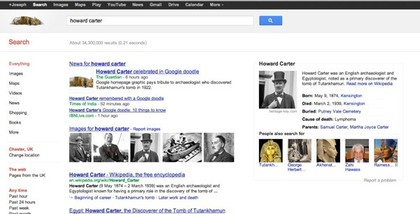Google's semantic search offerings teased
Takes on Wolfram Alpha, goes on a fact-finding mission

Google has taken its first steps in offering up facts as well as links in its search results.
Taking up the mantle that was first laid down in a clumsy manner by Ask Jeeves, the search giant has made no secret of the fact that it is looking to implement semantic search into Google.
Eventually it is hoping that the new system will be more like "how humans understand the world".
The way it is doing this is by matching up search queries with a database of 'entities' – so when you search for famous people and the like, you will get more factual information as well as the usual links.
The first glimpse of this has appeared on the web, with an Engadget reader taking a screengrab of Google when he Googled Howard Carter.
Carter wasn't just a name plucked out of obscurity but the person today's Google doodle is dedicated to.

Image credit: Engadget
Get daily insight, inspiration and deals in your inbox
Sign up for breaking news, reviews, opinion, top tech deals, and more.
Carter, the unstoppable search machine
Although we have been unable to get the same information, the grab does show Google revealing its semantic self, with a list of factual information about Carter positioned on the right hand side of Google's page – you know, the place that's usually dedicated to a lot of white space.
Here there is a picture of Howard Carter, as well as a small biography (which links to Wikipedia) and more information, such as where he was born, where he died and how he died.
It may not seem like a huge change for Google – and it is interesting the search engine is linking to Wikipedia like it is a bastion of factual information – but semantic search is the obvious next step for Google to take.
Wolfram Alpha may have brought this style of search to the forefront but the website has been marred by too many search requests coming back blank.
Google, when it does bring semantic search to the masses, shouldn't have this problem due to its vast archive.
Let's just hope that it doesn't go the way of Ask Jeeves, which promised a more human approach to search queries and ended up giving us a bungling butler and a whole host of irrelevant search results.
Via Engadget
Marc Chacksfield is the Editor In Chief, Shortlist.com at DC Thomson. He started out life as a movie writer for numerous (now defunct) magazines and soon found himself online - editing a gaggle of gadget sites, including TechRadar, Digital Camera World and Tom's Guide UK. At Shortlist you'll find him mostly writing about movies and tech, so no change there then.
